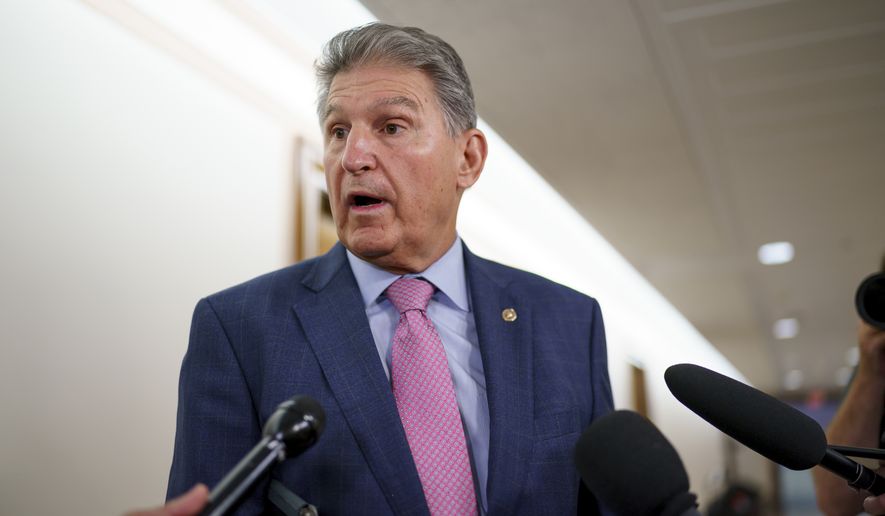Sen. Joe Manchin III, a key swing vote for the White House’s legislative agenda, argued Thursday that it would be disingenuous for President Biden’s multitrillion-dollar, 10-year social welfare bill to fund some key programs over a shorter five-year period to mask its true cost from voters.
The West Virginia Democrat said that since the package was looking to raise corporate and income over the span of a decade, then the programs funded by the hikes should run that span as well.
“If we’re going to tell the people we’re paying for something and the revenue is [for] 10 years … the program should be for 10 years,” he said.
The stance only complicates Mr. Biden’s efforts to strike a deal on the spending bill that has pitted moderate Democrats such as Mr. Manchin against party progressives looking to pass a far more ambitious package.
Originally, the White House wanted the spending bill to run upwards of $3.5 trillion and include long-sought liberal priorities such as free community college, amnesty for illegal immigrants, major climate programs and expanded health care coverage.
Centrist Democrats, including Mr. Manchin and Kyrsten Sinema of Arizona, balked at such ambitions. Instead, they urged Mr. Biden to temper the size and scope of the spending package.
Despite such calls going against the majority of congressional Democrats, they appear to be winning out, since both their votes will be needed to pass a Senate evenly divided between Republicans and Democrats.
That reality has already forced Mr. Biden to scale back his proposal from $3.5 trillion to roughly $2 trillion. Some Democrats even estimate the actual figure for the bill is likely to be as low as $1.75 trillion. The fate of a separate $1.2 trillion physical infrastructure bill is also inextricably linked to what happens with the larger spending bill.
To get to the lower figure, Mr. Biden has scrapped several proposals, including free community college.
Far-left Democrats hope to minimize such alterations, however. Rather than cut programs, they have proposed to curb the overall price tag by keeping the programs in the bill but funding them for a shorter period of time to keep down the nominal overall cost. The tactic is especially favored by progressives when it comes to long-sought priorities such as paid family leave and Medicare expansion.
“What I said to the president yesterday is that I really would prefer to have a shorter number of years,” said Rep. Pramila Jayapal, a Washington Democrat and a key progressive voice, when talking about paid family leave.
But Mr. Manchin argued Thursday that such tactics are fundamentally misleading and unfair.
“You’re not being genuine saying, ’Well, we’re going to pay for it with 10 years of revenue, but we’re only going to have a program for one or two or three [or] four years,’” he said. “That’s a hard no.”
Since Democrats are expecting no Republican votes in favor of Mr. Biden’s bill, Mr. Manchin is likely to have the final word.
• Haris Alic can be reached at halic@washingtontimes.com.




Please read our comment policy before commenting.